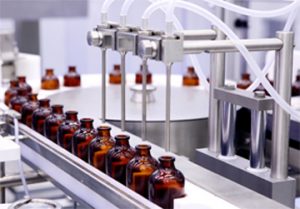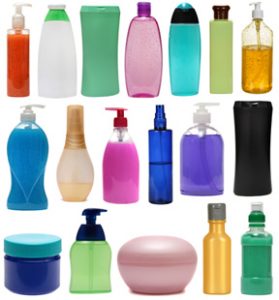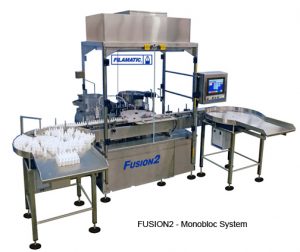All you want to do is buy the right liquid filling system. But no, nothing can be easy or straightforward nowadays… can it? So whatever industry you’re coming from, we know there are a lot of things to consider when trying to find the best solution for your needs. Today, we are going to briefly discuss the “5 Things You Must Know” when looking your liquid filling machine.
1. What is your desired fill rate?
One of the more important things to consider when choosing your liquid filling machine is your fill rate. How much do you want to fill per minute, per hour, per day and overall per month?
This is an important area of determination since it will also help in identifying the right level of automation for your needs. That is, filling a 5-gallon container vs a precision vial fill application is probably going to require a different type of filling solution. These types of details will also help with determining your setup options as it relates to your metering system, aka liquid filling pumps.
2. What type of liquid product do you have?
Sounds simple enough… what type of liquid product do you have?
Being able to clearly describe your liquid product as very viscous, semi-viscous, or a very fluid, water-like product, will go a long way in helping to match your production needs with the best solution.
Your type of liquid product may also require a specific environment. A level of cleanliness, or even system design may be something that needs to be taken into consideration; especially, when you are dealing with pharmaceutical, diagnostic and biotech environments. Aseptic filling, which means the product needs to be filled within a sterile environment, vs non-aseptic filling, so those basic, but very important details should be noted within your overall application.
When dealing with specialty chemicals, you may also have to consider if the product is flammable and requires an explosion-proof filling system. There are certainly stringent rules and regulations regarding how these types of flammable liquids need to be handled in a manufacturing and production environment.
3. What type of containers are you filling?
 When dealing with liquid filling applications, what you put your liquid product into is just as important as the product itself.
When dealing with liquid filling applications, what you put your liquid product into is just as important as the product itself.
There is a world of different bottle shapes, sizes, and types of associated caps as it relates to closing/capping requirements. You can muddy the waters even more, if you will, should your container require a fill stopper crimp cap, fill cap, press on cap, twist on, spray bottles, or even an atomizer spray – all completely doable, but certainly needs planning ahead and constant dialogue amongst the project team members. Liquid packaging can have a vast array of possible and creative solutions, but also pitfalls, if unaware.
Another part of the container aspect is understanding any labeling requirements. How difficult or easy is it to label your container’s surface? Also, what type of labeling solution do you want – a fully-automated, integrated labeler, or a standalone system? You can certainly incorporate whichever solution you prefer, but uncovering these needs ahead of time will ultimately save you time and money as you complete your project. If you’re seeing a theme, you are clearly ahead of the game… constant communication and planning ahead will always serve you well.
4. What level of automation do you want?
If you’ve already answered your initial question, “Q#1: What is your desired fill rate”, you’ve already taken a big step in determining what level of automation is best for your application.
For example, if you are filling about 5,000 bottles a day, or roughly 10-12 containers per minute, a Benchtop solution may best fit your needs. Whether a single or dual nozzle, a handheld semi-automatic Benchtop filling machine could be an excellent solution for your needs – an affordable, quality and workhorse solution.
Now let’s say your production requirements have you filling about 25,000 bottles per day, or roughly 50-52 containers per minute. Here, you may want to increase your production throughput by considering a slightly higher level of automation with an intermediate inline filling system, or even a higher output scenario with a larger Monobloc design. Of course, as you increase your levels of automaton, there are certain costs associated with those greater mechanical and electrical elements
Going back to your specific filling requirements, these different levels of automation may/may not make sense. Therefore, it’s important for your project team to be on the same page as it relates to your liquid filling application.
 5. What is your available floor space?
5. What is your available floor space?
Often overlooked until the later moments, another important aspect to consider when choosing a liquid filling system is your available floor space. You must accurately know your available clean room, laboratory or facility floor space. A bad scenario… you purchase an expensive production line that does not fit into your clean room or overall floor space – not good.
When determining your floor space, or the required footprint of your liquid filling machine, be sure to also factor in your human element as well. That is, your operators as well as any necessary space for inventory and supplies.
Of course, there are many other details to consider when looking for the right liquid filling solution for your needs. Just to name a few, lead times, available budgets, as well as specific industry requirements like fill accuracies may also help determine what type of liquid filling solution is right for you.
The best thing to do is not go on this journey alone. Do your homework, research a few companies, talk with their representatives, share relevant, appropriate details regarding your application, and be sure to prepare and understand the “5 Things You Must Know” when choosing your liquid filling system. For more information on liquid filling, capping and labeling solutions, please email info@filamatic.com or call 866.258.1914. Visit www.filamatic.com
